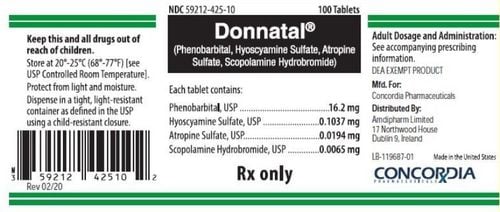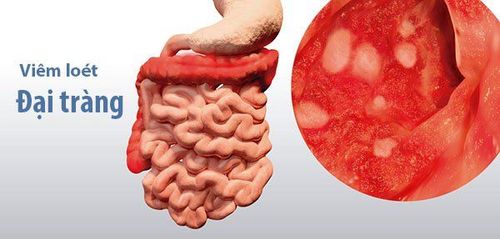This is an automatically translated article.
Posted by Master, Doctor Mai Vien Phuong - Department of Examination & Internal Medicine - Vinmec Central Park International General Hospital
Ulcerative colitis is a type of inflammatory bowel disease (IBD). It causes inflammation in the colon, also known as the large intestine. The inflammation can cause swelling and bleeding, as well as frequent diarrhea. For anyone, especially children, these symptoms can be difficult to experience. Ulcerative colitis is a chronic condition. There is no cure unless your child has surgery to remove all of their colon. However, your doctor can help you and your child manage the condition in several ways. Treatments for children are often slightly different from those for adults.
1. Symptoms of ulcerative colitis in children
Ulcerative colitis usually affects adults, but it can also occur in children. Children with ulcerative colitis may have many symptoms related to the inflammation. These symptoms can be moderate to severe.
Children with ulcerative colitis often pass through the peaks and valleys of the disease. Children may have no symptoms for a while, then may experience a flare-up of more severe symptoms.
Symptoms may include:
Anemia due to blood loss Diarrhea , possibly with some blood Fatigue Fatigue Malnutrition , because the colon also does not absorb nutrients Rectal bleeding Abdominal pain Unresolved weight loss tolerable Sometimes, a child's ulcerative colitis can be so severe that it causes other symptoms that seem unrelated to the digestive tract. Examples include:
Brittle bones Eye inflammation Joint pain Kidney stones Liver disorders Rash Skin lesions These symptoms can make ulcerative colitis difficult to diagnose. Symptoms may be the same as for another underlying condition.
On top of that, children may have difficulty explaining their symptoms. Teens may feel too embarrassed to discuss their symptoms.

2. What causes children to have ulcerative colitis?
Doctors don't know exactly what causes ulcerative colitis. Researchers think that in some cases, viruses or bacteria can trigger an inflammatory response in the colon.
However, several risk factors for this condition have been identified. One of the main risk factors for ulcerative colitis is having a close family member with the disease.
3. Diagnosing children with ulcerative colitis
There is no single test used to diagnose a child with ulcerative colitis. However, your doctor may do a variety of tests to rule out other conditions that have similar symptoms to ulcerative colitis.
They will start with a physical exam and review your child's medical history of symptoms. They will ask what makes the symptoms worse and better and how long they have been going on.
Other tests for ulcerative colitis include:
Blood tests, including checking for low red blood cell levels, which can show anemia and high white blood cell counts as a sign of an immune system problem A stool sample to check for the presence of blood, unwanted bacteria, and parasites An upper or lower gastrointestinal endoscopy, also known as a gastroscopy or colonoscopy, to view or take a sample of the contents of the gastrointestinal tract to check for signs of inflammation X-ray with barytate, which helps your doctor better view the colon on X-ray images and identify areas of the colon that may be narrowed or blocked
4. Treatment of ulcerative colitis in children
Treatment for ulcerative colitis may depend on the severity of your child's symptoms and the treatments their disease responds to. Ulcerative colitis in adults is sometimes treated with a special medicated enema.
However, children often cannot tolerate the use of an enema. If the child is able to take medication, some treatments include:
Aminosalicylates, to reduce inflammation in the colon Corticosteroids, to keep the immune system from attacking the colon Immunomodulators or TNF-blockers- alpha, to reduce the inflammatory response in the body

If your child's symptoms do not respond to these treatments and get worse, your doctor may recommend surgical removal of the affected part of their colon.
Your child can live without all or part of a colon, although removal may affect their digestion.
Removal of part of the colon does not cure the disease. Ulcerative colitis may reappear in the remaining part of the colon after surgery.
In some cases, your doctor may recommend removing your child's entire colon. Part of their small intestine will be redirected through the abdominal wall so that feces can escape.
5. Complications of ulcerative colitis in children
In some cases, children with ulcerative colitis will need to be hospitalized.
Ulcerative colitis that begins in childhood is also more likely to affect a large part of the colon. The extent to which the colon is affected is related to the severity of the disease.
Children with chronic diarrhea and colic can be confusing and difficult to experience. In addition to the physical effects, children may experience anxiety and social problems related to their condition.
According to a research article published in 2004, a child with IBD is more likely to have the following problems:
Shame about their condition Identity challenges, body image and self-esteem Behavior problems Difficulty developing coping strategies Delayed onset of puberty Missing school, which can affect learning When a child has IBD, it can also affect family relationships Families and parents may worry about how best to support their child.
The Crohn's and Colitis Foundation provides support and counseling to families of children with IBD.

6. Tips for Parents and Children Coping with Ulcerative Colitis
There are many things children and their parents can do to cope with ulcerative colitis and live a healthy and happy life.
Here are some places to start:
Educate loved ones, teachers and close friends about illnesses, nutritional needs, and medications. Seek the advice of a dietitian for meal planning to ensure your child is getting enough nutrients. Look for support groups for people with inflammatory bowel disorders. Talk to a counselor as needed. As soon as the child has symptoms, parents need to take the child to the doctor soon for timely treatment when the damage has not spread. Vinmec International General Hospital with a team of highly specialized and leading medical doctors, along with modern medical equipment of international quality, parents can trust to choose as a destination for medical examination and treatment. treat your child.
Please dial HOTLINE for more information or register for an appointment HERE. Download MyVinmec app to make appointments faster and to manage your bookings easily.
ReferencesDeFilippis EM, et al. (2016). pediatrics.aappublications.org/content/138/3/e20151971 Inflammatory bowel disease. (2016). Health care maintenance for the pediatric patient with inflammatory bowel disease. kidshealth.org/en/kids/ibd.html Inflammatory bowel disease: Parents, kids, and teens. (n.d.). crohnscolitisfoundation.org/youth-parent-resources Kappelman M, et al. (two thousand and thirteen). Recent trends in the prevalence of Crohn's disease and ulcerative colitis in a commercial inventory U.S. population. DOI: 10.1007/s10620-012-2371-5














